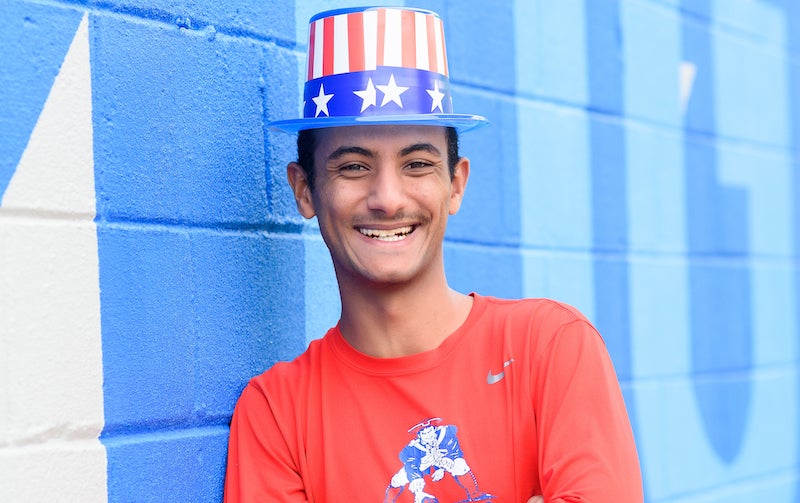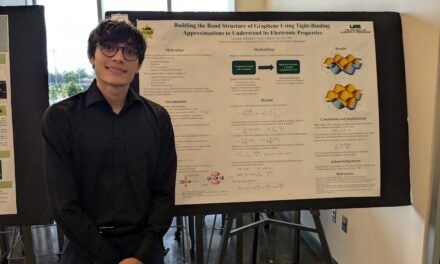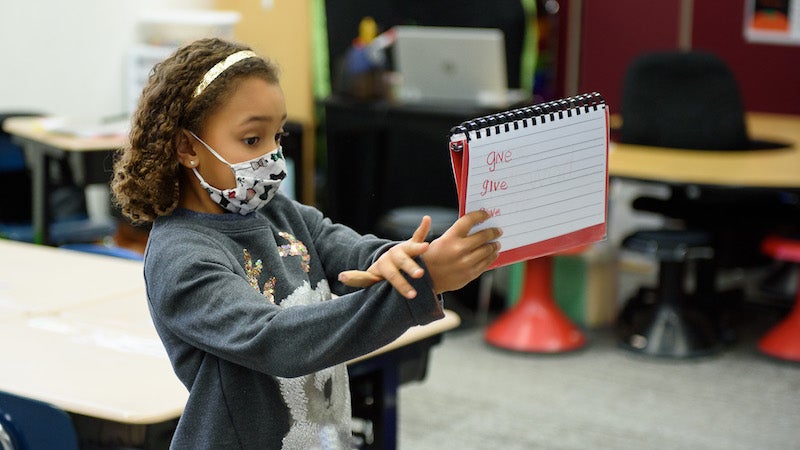By Rick Lewis
Talking with Abdul Maflahi, a senior at Homewood High School and this year’s “Mr. Homewood” honoree, you’ll quickly pick up on his propensity to smile, his refreshing earnestness, and his captivatingly positive outlook on life–one rooted in a belief that we each have the ability to share the best of ourselves with others. In short, you’ll likely leave the conversation feeling better about the world than you did before.
Maflahi’s engaging mixture of optimism, humility, and Homewood-pride, coupled with his scholastic success (he’s Sewanee-bound in the fall), belies the fact that he has only been living in the US, let alone speaking English, for six years. Originally born in Al-Dhalea, Yemen, Maflahi and his family moved to Homewood in 2016 as a result of the Yemeni Civil War, a still-roiling conflict.
His grandfather had lived in the US for many decades, and his father for close to twenty-five years, but the transition was more abrupt for Maflahi: he arrived in Alabama in the Spring of ’16 with the hope of a better life but no real connection to the community.
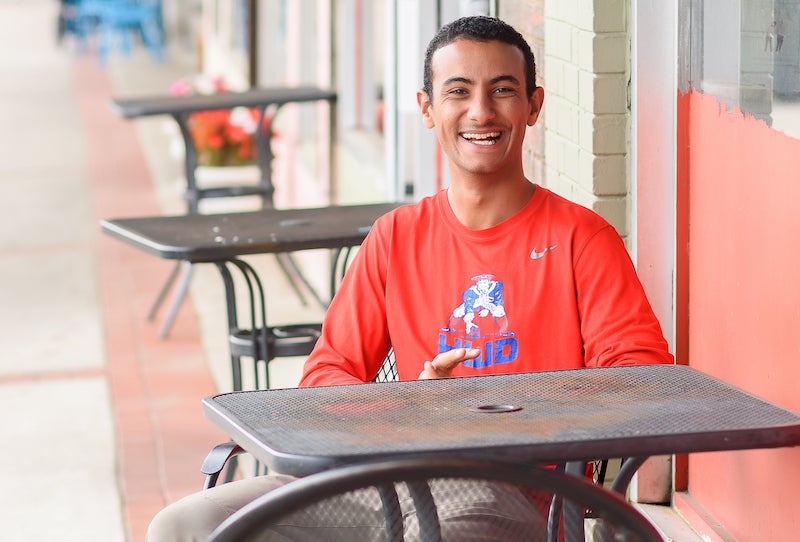
“I moved to Homewood on April 26th,” Maflahi explains. “I knew no English at the time, but I was fluent in Arabic–though, it didn’t help much. I had no clue about ‘Why Homewood?,’ but I was blessed.”
The thought of being uprooted from your home, leaving behind friends you had known for years, only to be dropped in a small community nearly 10,000 miles away (without having a grasp on the local language) is a daunting, if not insurmountable, challenge to picture. But Maflahi came here not only with a mission to succeed but also, a promise to do so.
“I have a dream to go back and help my friends [in Yemen],” he says. “Throughout my journey, I remember the promise I made to my friends there: That I will do my best to be successful and will one day go back to help.”
At first, naturally, he wasn’t totally sold on his situation. “I wasn’t interested in school when I first got here,” he says. “I always hated math in Yemen, and the first class I walked into here was math. I thought, ‘Oh no, not again.’”
However, initial reticence aside, Maflahi is someone who can look at an obstacle and not choose the wide path around it but instead plow straight through it.
“I believe I was born a fighter—quitting wasn’t an option. Having faith in God was the biggest thing I carried with me, as well as my dream, when I came here.” So, armed with his faith and his desire to build a better life for himself and others, he set off to chart his path.

As his dad didn’t have a driver’s license at the time, he would walk to school each day, “no matter the weather,” with his twin brother and younger sister, and committed himself to the idea that “education was the most powerful tool” one can use to help people.
But, according to Maflahi, what made the difference for him was the support, encouragement, and community that he found here in Homewood. From ESL teachers that would take him around to each class and spend extra time going over material with him, to kids in English class that would communicate with him over Google translate and his friend that taught him to read English left to right, he found a caring network of people that wanted to see him succeed.
“Homewood gave me the chance to learn,” he says. “It took the God-given potential within me and made it stronger.” Even the dreaded math class became his favorite subject. Seeing that he could be his full self here was a powerful source of inspiration for him to lean in, and lean in he did: He joined clubs, got involved in wrestling, track and football—a sport he broke both shoulders playing but still loves with a Southerner’s passion—and made it a point to meet his peers. He’s humble but not shy.
“I will talk to eight people on the way to the cafeteria and eight on the way back,” he explains. “You can call me Mr. Awkward or Mr. Weird, but every heart in Homewood has a unique story.”
In talking about his adopted town of Homewood, Maflahi frequently draws upon the word “blessed” to describe his being here, but if you talk to people that know him, they will explain it is Homewood that is blessed to have him. One of these people is Lisa Gaines, an English teacher at Homewood Middle School.
“I remember Abdul as a seventh-grader, newly separated from his life spent tending his seven sheep in the mountains of Yemen,” says Gaines. “Although Abdul neither spoke nor understood English, he settled right in, and his desire to learn and achieve surpassed that of many American-born students. He immersed himself in both American culture and in the culture of Homewood, while never compromising his own identity.”
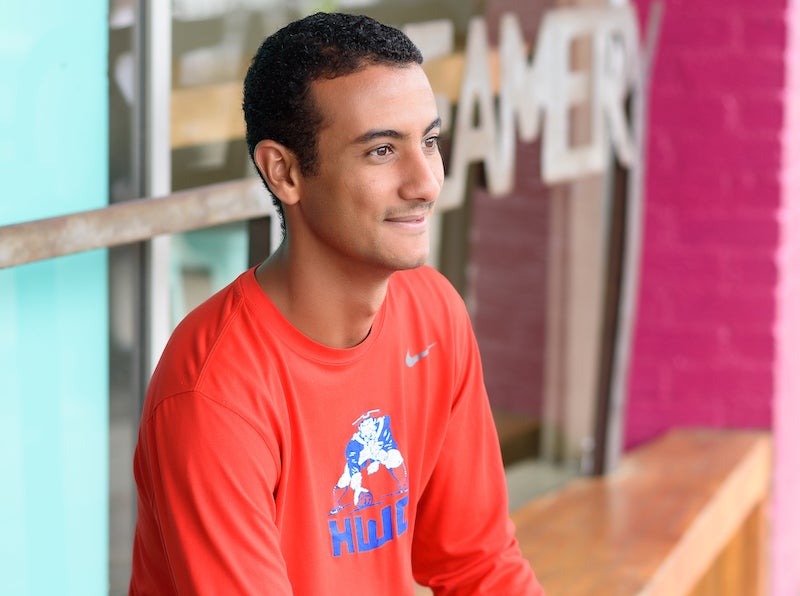
“What stands out about Abdul is his sense of humor,” she adds. “I will never forget the day his civics teacher and I were in the hall. Abdul strutted by and said, ‘This is how senators walk, and one day, I am going to be a senator.’ We laughed with him, but we never doubted him for a minute!”
In a testament to Maflahi’s undaunted spirit and his incredible path to achievement, he was selected as this year’s “Mr. Homewood,” the highest student award presented by the school’s teachers. Of course, while proud of this accomplishment, Maflahi is deferential in his remarks.
“It means a lot,” he says. “All that Homewood is doing for me, it’s not just for me. It’s for me as a son, a brother, a friend, and as hope to many others back home.” (He keeps in touch with friends back home daily).
“I have always heard your actions reflect who your God is,” Maflahi added. “Having great people around me gave me an example of how to show that.” A devout Muslim, he has been able to share so much of himself with a community that has delighted in returning the favor.
“Just like I thought my friends were behind and needed help. When I got here, I noticed the community here needs help: they invested in me,” he says. “It’s far for humans to reach perfection in this world, but the beautiful thing I’ve learned here in Homewood is that beauty is in the process of working towards perfection.”
As evidence that humor hides in the “beauty” of this “process,” a few weeks back, Maflahi and his friend who taught him to read from left to right were in English class working on a group essay. “He told me, ‘I want you to write it because you are the better writer,” says Maflahi. “It was so meaningful—I told him you are the one who taught me.”

